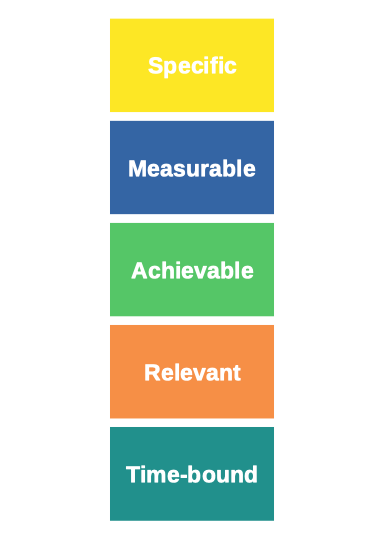Adulting 101
- Introduction to the Course
- Learn to Cook
- Personal Finance and Budgeting
- Tax Management
- Emotional Health & Relationships
- Time Management
- Exercise
- Meditation
- Self-directed Learning
- Case Studies and Discussion
- Conclusion & Way Forward
Time Management
Strategies for Effective Time Management

Mnemonic for a goal-setting criteria, which stands for: specific, measurable, achievable (or attainable), relevant, and time-bound.
Effective time management is a crucial skill that can help you achieve more in less time, reduce stress, and lead to career success. This article will cover various strategies that can help you manage your time more effectively.
Setting SMART Goals
SMART is an acronym that stands for Specific, Measurable, Achievable, Relevant, and Time-bound. When setting goals, ensure they meet these criteria. This approach makes your goals clear, directs your efforts, and increases the chances of achieving them.
The Importance of Planning and Scheduling
Planning and scheduling are essential for time management. They allow you to allocate your time where it's most impactful. Start by identifying your tasks, then estimate the time each task will take. Schedule these tasks into your day, prioritizing them based on their importance and deadlines.
Techniques for Avoiding Procrastination
Procrastination is a major hurdle in time management. Overcoming it requires conscious effort. Techniques include breaking large tasks into smaller, manageable parts; using a timer to work in focused bursts (known as the Pomodoro Technique); and rewarding yourself after completing tasks.
The Role of Breaks and Downtime in Effective Time Management
Contrary to what some may believe, taking regular breaks can actually improve productivity. Breaks allow your mind to rest, recharge, and stay focused. Similarly, ensuring you have downtime, time when you're not working or thinking about work, is crucial for maintaining long-term productivity and avoiding burnout.
Tools and Apps for Time Management
There are numerous tools and apps designed to help with time management. Google Calendar can help with scheduling, Trello is great for task management, and Asana is excellent for project management. Explore these tools and find what works best for you.
The Concept of Time Blocking
Time blocking is a time management method that asks you to divide your day into blocks of time. Each block is dedicated to accomplishing a specific task or group of tasks and only those tasks. This can help prevent multitasking and ensure you're fully focused on the task at hand.
Delegation and Its Role in Time Management
If there are tasks that others can do, consider delegating them. This can free up your time to focus on tasks that require your expertise. Remember, effective delegation involves clear communication of expectations and deadlines.
The Importance of Routine and Habits in Managing Time Effectively
Establishing routines can automate aspects of your life, reducing the need for decision-making and freeing up mental energy. Similarly, developing good habits, like maintaining a clean workspace or reviewing your to-do list each morning, can improve your productivity.
By implementing these strategies, you can take control of your time, increase your productivity, and reduce stress. Remember, effective time management is a journey, not a destination. Continually evaluate and adjust your strategies as needed.